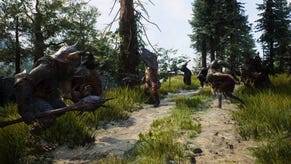OnLive's UK launch: Perlman on the cloud revolution
After 15 months of active service in the US, OnLive will make cloud gaming a reality in the UK tomorrow. Steve Hill talks to OnLive founder and futuregazer Steve Perlman in London.
Surrounded by an array of connected devices in an anonymous rented office space in West London, founder and CEO of OnLive, Steve Perlman, explains the concept behind his cloud gaming service. In fact, he explains it so thoroughly that the attendant PR is reduced to daubing “5 minutes” on a notepad and waving it hopefully in your correspondent’s general direction. Perlman is intent on getting his message across however, mere days before the UK launch of the service that he hopes will revolutionise gaming: “We’re certainly going to try.”
Kicking off with a layman’s clarification, Perlman confirms: “OnLive is cloud gaming. Basically, you’re used to playing videogames either on a console, on a PC, on a tablet or phone. Well, what we’ve done is make it so that videogames, instead of running in your home at all, are running at a data centre potentially a thousand miles away. And the high performance servers there are able to run the games at a much greater performance than you could possibly run at home. And when you want to play that game you just choose whatever device you like - whether it’s a television, PC, Mac, tablet, some Blu-ray players and so on - and you just connect the game and you play it.
"So, with the same flexibility that you currently have with streaming video or streaming music, it’s the same thing with OnLive, where any connected device can play the game.”
Presumably the benefit is having a swathe of games at your fingertips?
“It starts out with convenience,” says Perlman. “The games play instantly, they’re compatible, you don’t have to worry about selecting your hardware. But we’ve added a lot of other cool things, like we have this incredible community; you can actually watch people play live. You can make what’s called a brag clip. You can have voice chat with other people. It gives you a level of flexibility, spontaneity and community that never existed before.”
Your server farms must be the size of a small country.
“There’s thousands of servers, many thousands, but nonetheless when you have a vast number of people playing on them, the economics justify it. There are different varieties of server. The economics do work out, so it makes sense for us and we can actually offer very good value for the consumer.”
Split second
Amidst the various screens scattered in front of him is a Macbook playing Split/Second, an Android tablet playing Virtua Tennis 2009, and an iPad playing From Dust, replete with bespoke touch controls. There’s also an unfamiliar gamepad that comes with the OnLive micro-console that attaches to your television and broadband router. As Perlman says though, “We don’t have an agenda to sell controllers,” and OnLive games are compatible with Xbox pads, for instance, as well as Ye Olde keyboard and mouse.
With a variety of subscription packages, the obvious analogy is with Lovefilm, with £6.99 a month giving you access to over 100 games. In terms of support, Perlman says, “All the publishers are very excited. We have over 50 publishers: Bulletstorm from Electronic Arts, Square Enix, Ubisoft, we have THQ, some 2K games. And then we have lots of indie publishers which have some really great games.”
"We think of videogames today as a form of software, but with OnLive we’re turning it into a pure form of media, just like movies or music. Today, you don’t think about buying a CD for music – or not many people do; it’s pretty much made the transformation to digital. Movies are gradually switching over but everyone pretty much thinks it’s coming. For videogames, well, it’s inevitable.”
What they don’t have, obviously, is the key platform holders: don’t expect to be playing Gears Of War 3 or Resistance 3 on OnLive any time soon.
As Perlman admits: “Games will remain exclusive to PlayStation or Xbox. Certainly games that are exclusive to one platform are going to be exclusive to that platform. Maybe that’ll change one day.”
While some games can take a few weeks to appear on the service, there will be day one releases of the highest calibre: Deus Ex, for instance. In fact, according to Perlman, “The very first people playing it were on OnLive at 12:01 am - no download.”
Presumably that put a strain on the servers, but according to Perlman there hasn’t been a minute of downtime (or a lost save-game) in the 15 months OnLive has been running in the US.
“A lot of the tech we had to develop was to handle these big surges, like when a new game comes out,” he says.
“We’ve always been able to absorb that because of the way the system handles it. Behind the scenes, this is one of the most complex technologies. It was a ten-year development to get it to here. It’s a long, long road.”
Whether that journey signals the death knell for traditional consoles is debatable.
“I think that down the road, in time, it probably is the case that you’re going to want not just your games, but your movies and other things in the cloud," says Perlman.
"We went from physical media to download media, which still needed a local device, and this is the last stage of that evolution for videogames. We think of videogames today as a form of software, but with OnLive we’re turning it into a pure form of media, just like movies or music. Today, you don’t think about buying a CD for music – or not many people do; it’s pretty much made the transformation to digital. Movies are gradually switching over but everyone pretty much thinks it’s coming. For videogames, well, it’s inevitable.”
OnLive launches in the UK on September 22.









